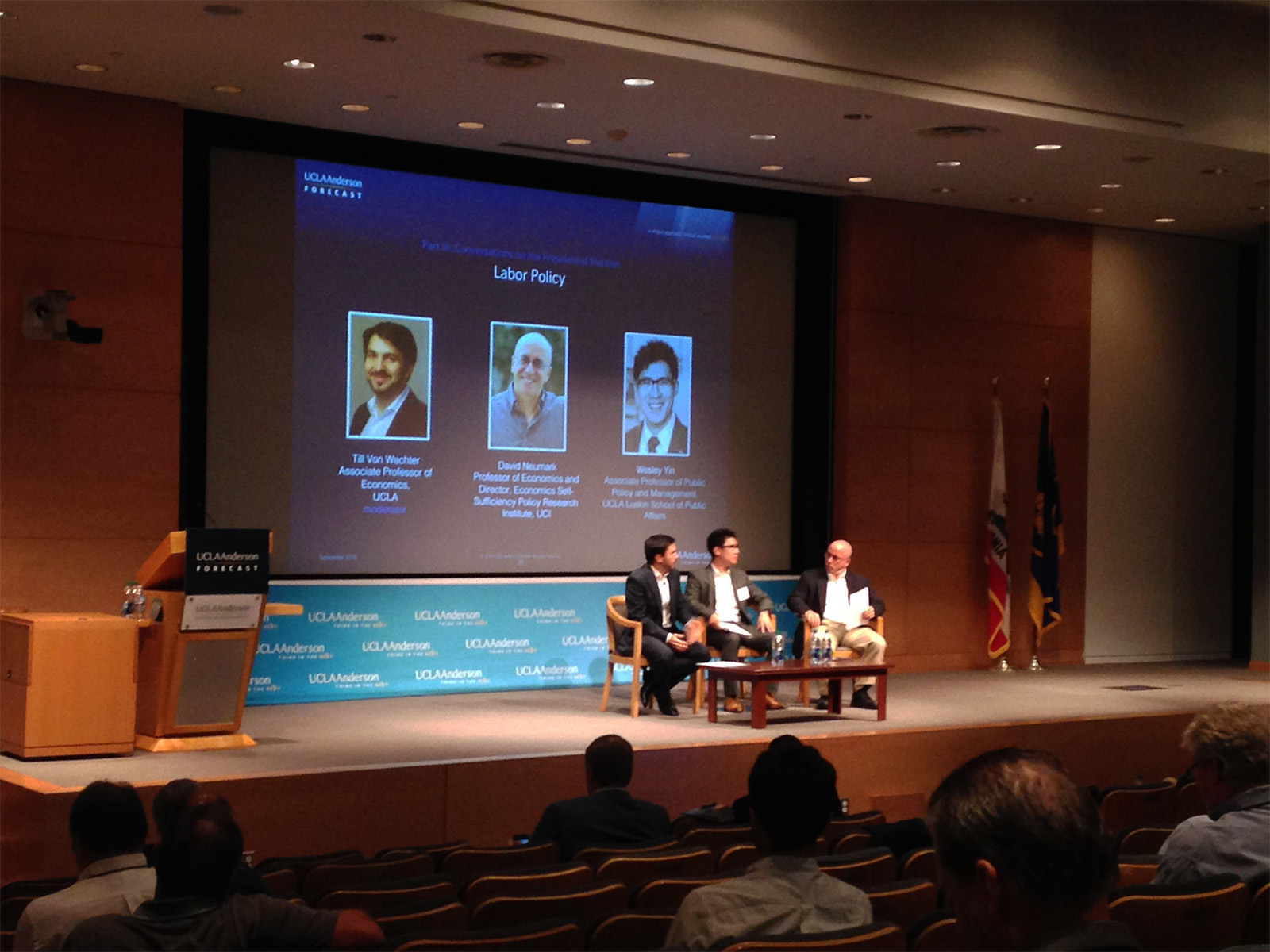Anderson event tackles economics of presidential candidates’ policies

UCLA Anderson Forecast had its September 2016 Economic Outlook on Wednesday, where speakers discussed the effects of the presidential candidates on the economy. (Ryan Leou/Assistant news editor)
By Ryan Leou
Sept. 29, 2016 12:49 a.m.
Economists and public policy experts discussed how the presidential election and the economy affect each other at the UCLA Anderson School of Management on Wednesday.
The UCLA Anderson Forecast, which is a study that predicts the economic growth of California and the United States a few times a year, held its September 2016 Economic Outlook at Korn Convocation Hall.
David Shulman, senior economist with the forecast, predicted the U.S. economy would grow about 2 percent, as it has done for several years after the recession. He also analyzed the tax and spending plans of Donald Trump and HIllary Clinton, which he said would both increase the federal deficit.
[Related: Experts predict Clinton win during Hammer Museum lecture]
Shulman said he thinks Trump’s plan would cut taxes for corporations and wealthy individuals by about $5 trillion over 10 years while increasing spending on defense and homeland security. Clinton, he said, would raise $500 billion with tax increases on wealthy individuals and increase spending on healthcare, infrastructure and college aid, among other areas.
“No matter who wins, deficits will increase,” Shulman said. “Entitlement programs (like Social Security and Medicare) begin to kick in (because there are more elderly people), causing the deficit go higher.”
He added unemployment would decrease and inflation would increase to targets set by the Federal Reserve, increasing the chances of an interest rate increase within the next year.
Jerry Nickelsburg, an economics professor at the UCLA Anderson School of Management, predicted California would reach full employment within the next two years, limiting the state’s economic growth to its population growth.
Nickelsburg also discussed the potential effects several state ballot propositions would have on the economy. California will have 17 different propositions, which address taxes, marijuana and the death penalty, among other topics.
Nickelsburg said he thinks if Prop 55 passes, state revenue could become more volatile because California relies on income tax from entrepreneurs. Prop 55 would extend the income tax on those making more than $250,000 from Prop 30 to fund education and healthcare.
“Prop 55 doubles down on that when the state has been in a growth phase (after the recession),” Nickelsburg said. “We don’t know where the tripping point between temporary and permanent tax increases is, and it could lead to a bigger swing in lower tax revenue (in a bad economy), causing more state program cuts.”
[Election coverage: UCLA student groups host presidential debate viewing parties]
Nickelsburg also said if Prop 64 passes and California legalizes recreational marijuana, revenue from taxes on marijuana could reach up to $1 billion and generate between 28,000 and 130,000 new jobs. He added the $5 billion total income from marijuana sales and employment paled in comparison to the state’s $2.5 trillion economy.
Economist William Yu said that, based on a model that combines state economic data with traditional factors like demographics, religion and incumbency approval rating, Clinton will win the election with 278 electoral votes to Trump’s 260. However Yu also said predictions for swing states are in the margin of error, so either Trump or Clinton could win.
Experts from different industries and universities also discussed different policy areas and possible effects of candidate proposals. The discussion on trade policy focused on the effects of the Trans-Pacific Partnership, a trade agreement between 12 Pacific Rim countries that account for approximately 40 percent of the world economy.
Both Clinton and Trump have said they oppose the TPP.
Stephen Cheung, president of the World Trade Center Los Angeles, said Los Angeles County depends heavily on international trade, so he thinks regardless of whether Congress approves TPP, it will affect LA’s economy.
Charles Wolf, Jr., a professor at the Pardee RAND Graduate School, says he thinks it is important for US companies to have the same market access to foreign countries as foreign firms have in the US.
UCI economics professor David Neumark and UCLA public policy professor Wesley Yin discussed labor policy and whether raising the minimum wage or Earned Income Tax Credit would be a better way to lower poverty and address income inequality. Clinton has proposed a federal minimum wage increase to $12, while Trump has said in interviews he supports a $10 minimum wage.
Anderson Forecast will hold another quarterly economic forecast in December.


